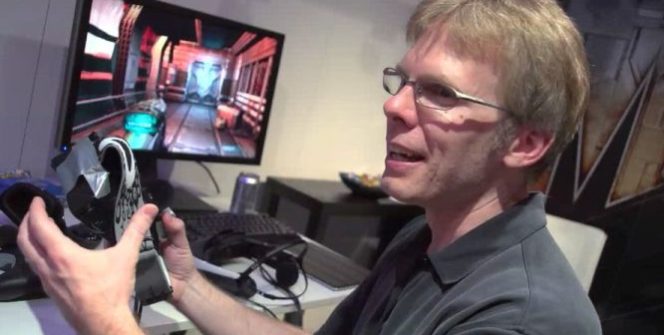The developer left Meta at the end of 2022 and believes that online-only games should not disappear.
He says it from a non-traditional developer’s perspective, having worked in virtual reality for many years. Last week, Meta announced that it would be shutting down Echo VR. It’s a zero-gravity sports game that was one of Oculus’ early successes, first on Rift and then Quest. Because of it, the company acquired the developers Ready at Dawn in 2020. Meta will discontinue the game on August 1, which is inconceivable because the game, released six years ago, has built up a fan base that Mark Zuckerberg’s company wants to throw in the trash. According to Andrew Bosworth, Meta’s head of technology, “these resources can be used for other things now that there are tens of millions of people in virtual reality.”
Carmack sent his response to UploadVR.As we’re speaking about a legendary developer, it’s fair to quote what he wrote: “I reached out to Boz as soon as I heard about the end-of-life announcement for Echo. We have been over similar discussions in the past — I thought it was a mistake not to keep Oculus Rooms running and port to Quest, and I thought it was a mistake to abandon all the GearVR/Go content when my emulation layer worked for at least a good chunk of things. I believe in saving everything.
Even if there are only ten thousand active users, destroying that user value should be avoided if possible. Your company suffers more harm when you take away something dear to a user than you gain in benefit by providing something equally valuable to them or others. User value is my number one talking point, but “focus” is pretty high up there, and opportunity cost is real. I think there is likely a degree of motivated reasoning internally that tilts the table towards “just kill it.” Still, it is challenging to argue for alternatives, and I thought Boz’s statement was honest and true. Boz gave the green light to release the Oculus Go root build that I had long agitated for, but after seeing how much internal effort was involved in making it happen, I almost felt bad about it. The constraints are just different in a company the size of Meta.
I can make a case for several possible options. Drop to absolutely minimal support. Put a single developer in charge of maintaining it and doing what they can with the community. At Id Software, we had one guy managing Quake Live for a long time, and I think that was the right thing to do. This would almost certainly not “earn out” on a cost-benefit analysis for Echo. Still, a lot of people are spent on worse things, and despite me always harping about efficiency, I would consider it justified for the intangibles.
Spin off the project. I suggested they see if anyone on the team wanted to leave Meta and take over the project. The team members can see the dashboards and evaluate if there is any viable path for the game to support even one developer. There may be people internally that think the game development has been mismanaged, and there is a chance for a renaissance if different decisions are made. I suggested that they offer to sell the rights for $10k. Meta paid millions of dollars to acquire Ready at Dawn, which would be a bitter pill to swallow, but it would still be a net good for VR. Unfortunately, the process to spin something off is far from simple at Meta and involves much government oversight. A problem with both options is that there may be nobody with the skills interested in doing that. Shepherding a product through its twilight years is not the playbook for significant tech career advancement. Game dev does have a different crowd, but there are a lot of incentives once you are inside Meta that start changing people’s thinking. They could slap an “unsupported” banner on it and let it continue until something dies rather than explicitly kill it. As things rot, there would be more and more petitions and agitation to have just one engineer go in to make a simple little fix for whatever breaks, and it could wind up being more net animosity than just cleanly killing it.
Open source the project. This would double as a good developer example, although the Echo codebase is very different than Unity, where most VR developers work. I never looked at the Echo codebase, but most large commercial codebases have various things that are licensed rather than owned. Working around them can be a significant engineering task, and missing something can risk legal repercussions, so even putting out a non-functional partial dump is hazardous. A small developer can, in theory, just stick a license comment header on all the files and throw the project on GitHub, but this rarely happens (to my sorrow!). The effort to do it at Meta, with all the legal and technical reviews, is much greater, and the hazards are much worse. While this is foremost a business problem, there are still technical plays that can help in the future, and I encourage everyone, in and out of Meta, to think about them:
“Keeping things alive takes work” is true at some level, but it is possible to build systems that run untouched for years and come up fine after a reboot. Today’s default may be a distributed mess of spaghetti, but that is a choice. A system that has been operating for years can take the path of evolving to greater robustness each time an issue manifests. Every game should make sure they still work at some level without central server support. Even when not looking at end-of-life concerns, being able to work when the internet is down is valuable. If you can support some level of LAN play for a multiplayer game, the door is at least open for people to write proxies in the future. Supporting user-run servers can save on hosting costs and open various community creative avenues.
Be disciplined about your build processes and what you put in your source tree, so there is at least the possibility of making the project open source. Think twice before adding dependencies that you can’t redistribute, and consider testing with stubbed-out versions of the things you use. Don’t do things in your code that wouldn’t be acceptable for the whole world to see. Most game development is a panicky rush to make things stop falling apart long enough to ship, so it can be hard to dedicate time to fundamental software engineering. Still, it is satisfying, and it can pay off with less problematic late-stage development,” Carmack wrote.
“I believe in saving everything” is the key phrase. Carmack explained why it’s a problem when a game is discontinued and can never be played again (Darkspore from Electronic Arts is just one example). Add Denuvo, which many publishers refuse to remove from their product, even though it’s been 4-5 years after the game was released. The disappearance of online games leaves a void that could be solved by publishing the source code and the programs needed to run a user-made server.
Remember that while Carmack worked at id Software, he always made the source code for id Tech engines publicly available over time. It seems to have been forgotten by Bethesda and Microsoft since then!
Source: PCGamer
















Leave a Reply